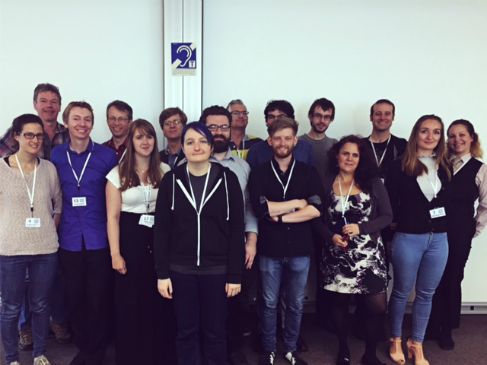Name a (living) mathematician.
Name a piece of maths that you’ve always loved.
Name a mathematical nugget that has surprised you. (Tweet us these, we’d love to hear them.)
Where and how did you find out about these things? Was it school, or a talk or lecture, or a conference, a book or an article, or a conversation with a friend or colleague?
There are, out there, a veritable army of people – besides teachers – whose personal and professional lives are dedicated to explaining maths to others and to enthusing and inspiring attitudes towards mathematics through circus skills, videos, comedy, books, articles, live experiments, brilliant analogy, and the sheer force of their charisma.
You may have heard of or seen examples of these fine humans such as Ben Sparks, Matt Parker, Timandra Harkness, Andrew Jeffery, James Grime, Katie Steckles, Rob Eastaway, Colin Wright. Imagine all these people – plus many more – collected together in one place to talk about talking about maths. Last weekend I had the pleasure of attending ‘Talking Maths in Public’ at Bath University, an event designed to bring together a disparate group of such people who are all striving towards the same goal, and to discuss how we could all support, advise and collaborate with one another.

The event was a masterclass in helpful tips, opening paths for new ideas and creating space for ‘what-if’ conversations. Top of the agenda in many discussions was a focus on representation – not only of mathematics, but of mathematicians, what our audiences consider typical of both, and how to crack those stereotypes wide open. There are people all over the country (and throughout the world) who right now are doing exactly that: how can we better connect them all together?
The way we talk about mathematics and mathematicians in public – and how this is changing – is an interesting idea for consideration. Increasingly, as we connect with like-minded others on social media, we are having conversations in public that used to be private. For some of us, our deep and abiding love for mathematics and for teaching it is coming out of the closet. The use of the internet to connect people who love maths (and to give them the confidence to express it more freely), as well as the high-profile figures who are making it into mainstream media, have the potential to make maths – the maths we as specialists know and love and recognise – public.
Of course, ‘talking maths in public’ is no different to maths teaching – the medium and the audience may sometimes be more varied, but the skills are the same. This weekend, I considered how to make a maths joke, how to make an idea memorable through analogy, how to write a maths book and how to make a maths video. Watching other people’s tremendously creative versions of these gave me confidence to try my own ideas and made me reflect on teaching-as-entertainment. How important is engagement and fun in the classroom? How often should (and can) we deliver those memorable, amazing lessons with bells and whistles? How often are we as a maths education community sharing our original and exciting lesson ideas and how often are we scared of criticism for doing so?